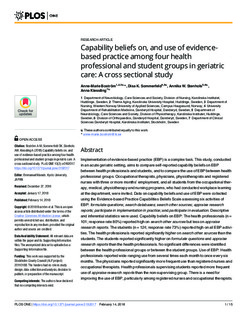| dc.contributor.author | Boström, Anne-Marie | |
| dc.contributor.author | Sommerfeld, Disa K | |
| dc.contributor.author | Stenhols, Annika W | |
| dc.contributor.author | Kiessling, Anna | |
| dc.coverage.spatial | Sweden | nb_NO |
| dc.date.accessioned | 2019-01-29T14:49:28Z | |
| dc.date.available | 2019-01-29T14:49:28Z | |
| dc.date.created | 2018-09-12T13:26:16Z | |
| dc.date.issued | 2018 | |
| dc.identifier.citation | Boström, A.-M., Sommerfeld, D. K., Stenhols, A. W., & Kiessling, A. (2018). Capability beliefs on, and use of evidence-based practice among four health professional and student groups in geriatric care: A cross sectional study. Plos One, 13(2). | nb_NO |
| dc.identifier.issn | 1932-6203 | |
| dc.identifier.uri | http://hdl.handle.net/11250/2582911 | |
| dc.description.abstract | Implementation of evidence-based practice (EBP) is a complex task. This study, conducted in an acute geriatric setting, aims to compare self-reported capability beliefs on EBP between health professionals and students, and to compare the use of EBP between health professional groups. Occupational therapists, physicians, physiotherapists and registered nurses with three or more months’ employment, and all students from the occupational therapy, medical, physiotherapy and nursing programs, who had conducted workplace learning at the department, were invited. Data on capability beliefs and use of EBP were collected using the Evidence-based Practice Capabilities Beliefs Scale assessing six activities of EBP: formulate questions; search databases; search other sources; appraise research reports; participate in implementation in practice; and participate in evaluation. Descriptive and inferential statistics were used. Capability beliefs on EBP: The health professionals (n = 101; response rate 80%) reported high on search other sources but less on appraise research reports. The students (n = 124; response rate 73%) reported high on all EBP activities. The health professionals reported significantly higher on search other sources than the students. The students reported significantly higher on formulate questions and appraise research reports than the health professionals. No significant differences were identified between the health professional groups or between the student groups. Use of EBP: Health professionals reported wide-ranging use from several times each month to once every six months. The physicians reported significantly more frequent use than registered nurses and occupational therapists. Health professionals supervising students reported more frequent use of appraise research reports than the non-supervising group. There is a need for improving the use of EBP, particularly among registered nurses and occupational therapists. Supervision of students might enhance the motivation among staff to increase the use of EBP and students’ high EBP capability beliefs might inspire staff in this matter. | nb_NO |
| dc.language.iso | eng | nb_NO |
| dc.rights | Navngivelse 4.0 Internasjonal | * |
| dc.rights.uri | http://creativecommons.org/licenses/by/4.0/deed.no | * |
| dc.title | Capability beliefs on, and use of evidence-based practice among four health professional and student groups in geriatric care: A cross sectional study | nb_NO |
| dc.type | Journal article | nb_NO |
| dc.type | Peer reviewed | nb_NO |
| dc.description.version | publishedVersion | nb_NO |
| dc.rights.holder | © 2018 Boström et al. | nb_NO |
| dc.subject.nsi | VDP::Medisinske Fag: 700::Helsefag: 800::Helsetjeneste- og helseadministrasjonsforskning: 806 | nb_NO |
| dc.source.pagenumber | 1-15 | nb_NO |
| dc.source.volume | 13 | nb_NO |
| dc.source.journal | PLoS ONE | nb_NO |
| dc.source.issue | 2 | nb_NO |
| dc.identifier.doi | 10.1371/journal.pone.0192017 | |
| dc.identifier.cristin | 1608888 | |
| cristin.unitcode | 203,6,3,0 | |
| cristin.unitname | Avdeling for helsefag - Stord/Haugesund | |
| cristin.ispublished | true | |
| cristin.fulltext | original | |
| cristin.qualitycode | 1 | |

